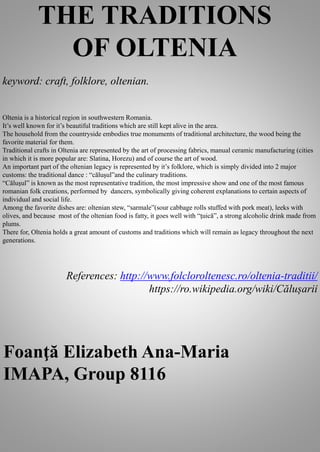Prezentare Engleza
- 1. THE TRADITIONS OF OLTENIA keyword: craft, folklore, oltenian. Oltenia is a historical region in southwestern Romania. It’s well known for it’s beautiful traditions which are still kept alive in the area. The household from the countryside embodies true monuments of traditional architecture, the wood being the favorite material for them. Traditional crafts in Oltenia are represented by the art of processing fabrics, manual ceramic manufacturing (cities in which it is more popular are: Slatina, Horezu) and of course the art of wood. An important part of the oltenian legacy is represented by it’s folklore, which is simply divided into 2 major customs: the traditional dance : “căluşul”and the culinary traditions. “Căluşul” is known as the most representative tradition, the most impressive show and one of the most famous romanian folk creations, performed by dancers, symbolically giving coherent explanations to certain aspects of individual and social life. Among the favorite dishes are: oltenian stew, “sarmale”(sour cabbage rolls stuffed with pork meat), leeks with olives, and because most of the oltenian food is fatty, it goes well with “ţuică”, a strong alcoholic drink made from plums. There for, Oltenia holds a great amount of customs and traditions which will remain as legacy throughout the next generations. References: http://www.folcloroltenesc.ro/oltenia-traditii/ https://ro.wikipedia.org/wiki/Călușarii Foanţă Elizabeth Ana-Maria IMAPA, Group 8116
